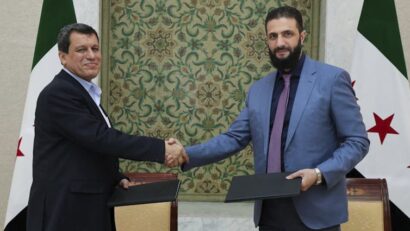
After mass killings in Syria, can a fragmented country stay united?
Shortly after the fall of Bashar al-Assad’s regime in Syria, the new government led by rebel leader Ahmed al-Sharaa pledged to unite Syrians and establish a “civil peace” in the country.
In recent days, this fragile peace has been tested. Late last week, clashes broke out between government security forces and the remnants of pro-Assad militias in the former president’s stronghold of Latakia province on the northwestern coast. More than 1,000 people were killed, mostly civilians.
In a positive sign, a major deal was struck on Monday between the government and another armed faction, the Syrian Democratic Forces (SDF) of the semi-autonomous Kurdish region in northeastern Syria. The SDF has agreed to integrate all of its forces and institutions with the central government in Damascus.
Yet, the threat of more violence in the fractured country remains. This raises serious doubts about whether al-Sharaa’s vision can become a reality.
Syria’s interim president, Ahmad al-Sharaa, right, shakes hands with the commander of the Kurdish-led Syrian Democratic Forces in Damascus on Monday.
SANA/AP
What caused the recent violence?
The unrest in Latakia was sparked by an ambush attack by pro-Assad gunmen against government security forces (composed primarily of former rebel fighters) last Thursday. This reignited old wounds from Syria’s 13-year civil war, triggering the deadliest violence since the fall of al-Assad in December.
According to the Syrian Observatory for Human Rights, at least 1,068 civilians were killed in the violence – mostly members of the Alawite minority (a sect of Shiite Islam), as well as some Christians.
The United Nations said it had received “extremely disturbing” reports of entire families being killed, including children.
Many members of Assad’s family and his former regime’s high-ranking officials belong to the Alawite minority. Tensions have persisted between these Assad loyalists and the new government, which is dominated by Sunni factions with a history of jihadist and anti-Shiite leanings.
The government said its operations against the pro-Assad forces had ended by Monday. Al-Sharaa also acknowledged that human rights violations had occurred and announced an investigation to identify those responsible.
However, he placed primary blame on the pro-Assad groups for instigating the violence. While defending the crackdown overall, he stressed that security forces should not “exaggerate in their response”.
Following the violence, US Secretary of State Marco Rubio expressed solidarity with Syria’s religious and ethnic minorities, calling on the interim government to hold the perpetrators accountable.
The European Union, which recently eased some restrictions on Syria to support an “inclusive political transition”, also condemned the violence.
Transitional justice is key
In a diverse and deeply divided country like Syria, the decades of dictatorship eroded national identity and fueled sectarian conflict. This is why a comprehensive process of transitional justice is essential.
Such a process would help bridge the divisions between different ethnic and religious communities. This would foster national unity, while respecting the unique identities of individual groups.
Although the new administration has emphasised the importance of social cohesion, its forces are accused of acting counter to this pledge and carrying out extrajudicial killings. Sectarian rhetoric from some pro-government figures has only further inflamed tensions.
A dead body lies on a road following violence between government forces and supporters of the former Syrian regime in Jableh, a town in Latakia province.
Mohamed Daboul/EPA
Additionally, Alawites have faced increasing marginalisation, including dismissals from public employment, salary cuts and targeted persecutions.
These developments underscore Syria’s urgent need for an independent transitional justice committee. Without a structured approach to hold those accountable for crimes committed under the Assad regime and national reconciliation, the country risks replacing one cycle of repression with another. This will only deepen grievances, not heal them.
A well-designed justice process is crucial to help Syrians move beyond the trauma of the previous regime and build a stable, inclusive future.
Challenges to a united Syria
Amid the ongoing turmoil, the recent agreement signed between the Syrian Democratic Forces (SDF) and al-Sharaa’s government has raised hopes the country may still have a chance to maintain its unity and avoid fragmentation.
However, the details of how the SDF forces will be integrated remain unclear. Will the Kurds finally achieve their long-held demand for semi-autonomy within a federal state? Or will this integration mark the end of their aspirations?
The situation is equally complex for the Alawites and Druze communities in the western and southern regions of Syria, given they have two powerful regional forces backing them.
A fighter of the Druze Liwa al-Jabal militia guards a hilltop in Syria’s southern province of Sweida.
Omar Sanadiki/AP
Israel has made significant inroads in the Druze areas of southern Syria, offering to defend the Druze if necessary. Similarly, Iran continues to support the Alawites, with its leadership predicting an uprising against the new Syrian regime.
These dynamics present serious obstacles to Syria’s unity. In such a polarised environment, a federal system may be the last viable option to preserve the country’s cohesion. However, if the new regime continues to reject this idea, the country risks fragmentation and undoubtedly more violence. Läs mer…